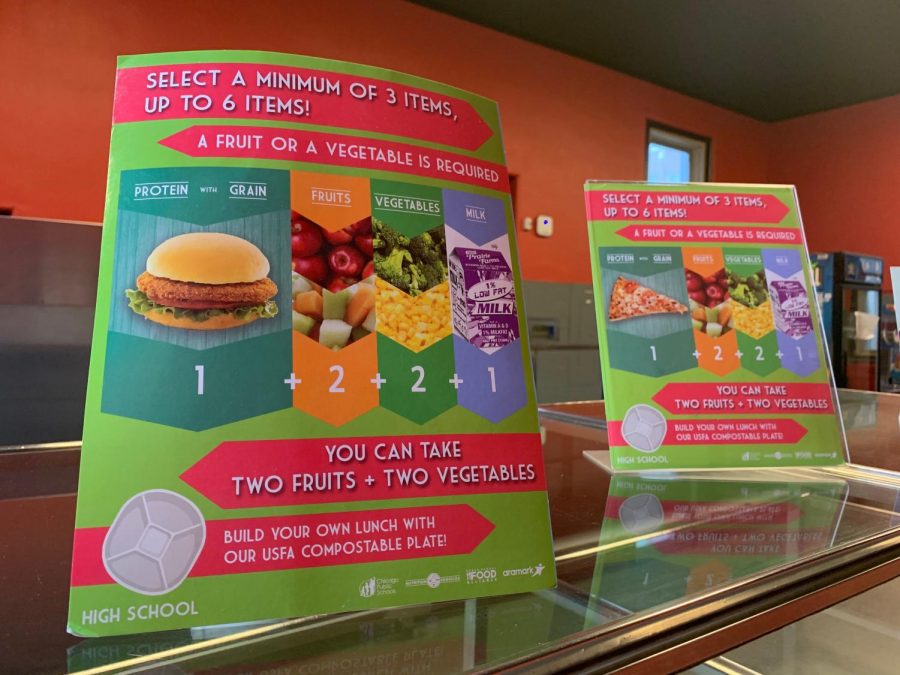CPS strikes back against USDA lunch rollbacks
Student lunch is now based off MyPlate standards, as depicted in the diagram; however, it may be removed by new USDA rollbacks.
Surrounded by posters advertising the MyPlate values and the five food groups, students shuffle into the cafeteria. Upon entering, students are faced with a main meal option and fruits and vegetables, which they must take. The food that students are required to take may change in some states, but not with support from the state of Illinois.
Last December, school lunch rollbacks were introduced by the USDA and the Trump administration. The rollbacks would loosen up the sodium and refined grain standards set by Michelle Obama’s Healthy, Hunger-Free Kids Act of 2010.
Dr. Allison Polke, CPS dietician, said she works on creating the healthiest lunches students can have so they can perform better in the classroom.
“The current school lunch standards are based on the dietary guidelines for Americans,” Polke said. “I don’t know if you’re familiar with like MyPlate or the food pyramid but that kind of is a nice visual for how people should eat, and then the dietary guidelines for Americans digs a little bit deeper into the specifics of things like sodium, calories, fat and so school standards are based off of that.”
Essentially, the current standards were created to focus on the American dietary guidelines. These guidelines have been used since the Obama presidency and many states wish for those guidelines to stay in place.
According to the Chicago Tribune, New York is one of the states suing over the rollbacks and it does not stand alone.
The other plaintiffs are California, Illinois, Minnesota, New Mexico, Vermont and the District of Columbia, Larry Neumeister in the Chicago Tribune said.
With Illinois part of the group of states suing, CPS has shown a voice of support against the introduced school lunch rollbacks.
“CPS has committed to not changing our current sodium standard and is not planning on rolling back our whole grain standard either,” Polke said. “I’m a dietician so I fully support the initial regulation that all foods need to be whole grain.”
Polke is not the only member of CPS who supports this. Mr. Tennison, Lane’s Principal, said that CPS standing up to these rollbacks makes him feel proud.
By standing their ground against rollbacks CPS is using their voice to support over 350,000 students with a majority of them eating school lunch.
“It’s about between 60 and 70 percent, which kind of varies each month and each week and each day, are eating school lunch,” Polke said.
With a majority of students eating school meals, not only are the state and staff concerned, but the students are as well.
Keilu Sanchez, Div. 167, a frequent visitor of Lane’s cafeteria during lunch, said that he supports Illinois suing the USDA and Trump administration as he thinks the lunch requirements staying the same is vital to students’ health.
“Lunch and breakfast are the most healthy meals of the day and teens need it to be healthy,” Sanchez said.
Polke hopes students will take their own action to benefit their health and keep the most important meals of the day in their minds. She said that she thinks that while students do have to take a fruit or vegetable, they oftentimes do not actually eat them.
“Students will oftentimes take those things and throw them straight in the garbage, which is not the point of the program. We have to make sure that we have healthy students, not healthy garbage cans,” Polke said.
Sanchez said that not only should the students work on eating more vegetables and fruits at lunch time but the manufacturers of the school lunch foods should use fewer processed foods.
“They should stop using fake processed foods,” Sanchez said. “They should include better salads and fruits that don’t look processed and make the food more appealing while still more healthy.”
Overall, the biggest concerns to CPS, according to Polke, are the student’s health and ability to perform in the classroom setting.
Echoing both Sanchez’s and Polke’s sentiments Tennison said, “We have a responsibility to provide the healthiest lunches [we can].”
Your donations directly fund the Lane Tech student journalism program—covering essential costs like website hosting and technology not supported by our school or district. Your generosity empowers our student reporters to investigate, write, and publish impactful stories that matter to our school community.
This website is more than a publishing platform—it's an archive, a research tool, and a source of truth. Every dollar helps us preserve and grow this resource so future students can learn from and build on the work being done today.
Thank you for supporting the next generation of journalists at Lane Tech College Prep!

Ella, a senior, is enjoying her third and final year with The Champion (formerly The Warrior). She continues to explore the world of literature and history...

Daniela Ciesielski is currently in her senior year at Lane Tech. This is her 2nd year being part of the Warrior and she is exited to pursue her role as...




